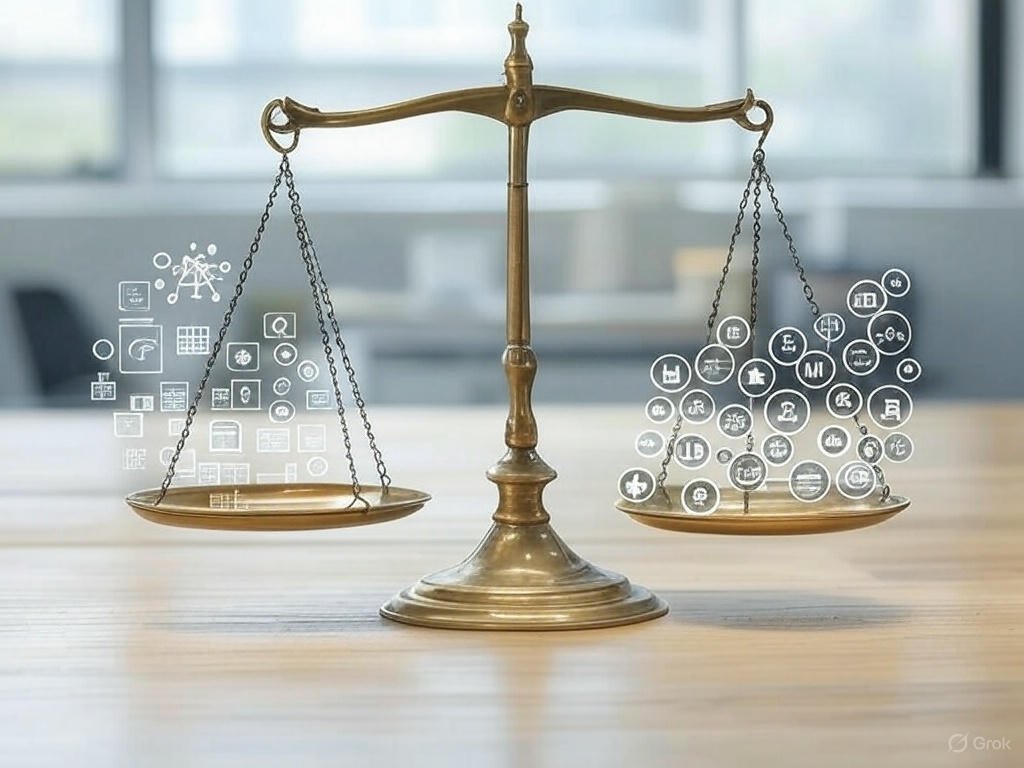AI in 2025: How Artificial Intelligence Is Reshaping Industries
Artificial intelligence (AI) has evolved from a futuristic concept to a transformative force that is reshaping industries across the globe. By 2025, AI is expected to reach unprecedented levels of sophistication, driving innovation, efficiency, and growth in ways previously unimaginable. This article delves into the profound impact of AI on various sectors, exploring how it is revolutionizing processes, enhancing decision-making, and creating new opportunities for businesses and individuals alike.
As we stand on the brink of this technological revolution, understanding the role of AI becomes crucial. From healthcare to finance, education to manufacturing, AI is not just an auxiliary tool but a central pillar of modern industry. Its ability to analyze vast amounts of data, identify patterns, and make predictions with remarkable accuracy positions it as a game-changer in virtually every field. Let’s explore how AI is transforming industries and what this means for the future.
“Artificial intelligence will reach human levels by around 2029. Follow that out further to, say, 2045, and we will have multiplied the intelligence—the human biological machine intelligence of our civilization—by a billion.”
— Ray Kurzweil, Futurist and AI Visionary

The Role of AI in Healthcare: Revolutionizing Patient Care and Medical Research
Healthcare is one of the most promising domains where AI is making significant strides. By 2025, AI-powered systems are expected to streamline diagnostics, enhance patient care, and accelerate medical research. Machine learning algorithms are already being used to analyze medical images with precision that rivals or even surpasses human experts. For instance, AI tools can detect early signs of diseases such as cancer, cardiovascular conditions, and neurological disorders by processing MRI scans, X-rays, and CT scans faster and more accurately than traditional methods.
Beyond diagnostics, AI is transforming personalized medicine. Predictive analytics and genomics are enabling doctors to tailor treatments based on an individual’s genetic makeup, lifestyle, and health history. This shift from a one-size-fits-all approach to personalized care ensures better outcomes and reduces the risk of adverse reactions to medications. Furthermore, AI-driven wearable devices are empowering patients to monitor their health in real-time, providing valuable data that can be used to prevent illnesses before they manifest.
In medical research, AI is accelerating drug discovery and clinical trials. By analyzing vast datasets, AI models can identify potential drug candidates, predict their efficacy, and optimize trial designs. This not only reduces the time and cost associated with bringing new drugs to market but also increases the likelihood of success. For example, during the COVID-19 pandemic, AI played a pivotal role in identifying existing drugs that could be repurposed to treat the virus.
“AI in healthcare is not about replacing doctors; it’s about augmenting their capabilities to provide better care.”
— Dr. Eric Topol, Cardiologist and Digital Medicine Expert

AI in Finance: Redefining Banking, Investments, and Risk Management
The financial sector is undergoing a seismic shift thanks to AI. By 2025, AI will be deeply embedded in banking, investments, fraud detection, and customer service. One of the most visible applications is in algorithmic trading, where AI systems analyze market trends and execute trades at speeds and accuracies unattainable by humans. These systems can process millions of data points in milliseconds, identifying profitable opportunities and mitigating risks.
Fraud detection is another area where AI is proving invaluable. Traditional methods of identifying fraudulent activities often rely on predefined rules, which can be easily circumvented by sophisticated cybercriminals. AI, on the other hand, uses machine learning to detect anomalies in transaction patterns, flagging suspicious activities in real-time. This proactive approach not only protects consumers but also saves financial institutions billions of dollars annually.
Customer service in banking is also being transformed by AI-powered chatbots and virtual assistants. These tools provide 24/7 support, answering queries, resolving issues, and even offering personalized financial advice. For instance, robo-advisors use AI to create investment portfolios tailored to an individual’s risk tolerance and financial goals, democratizing access to wealth management services.
Risk management is another domain benefiting from AI. By analyzing historical data and external factors such as economic indicators and geopolitical events, AI models can predict potential risks and suggest mitigation strategies. This capability is particularly crucial in an increasingly volatile global economy.
“AI is not just a tool for efficiency; it’s a catalyst for innovation in the financial sector.”
— Satya Nadella, CEO of Microsoft

AI in Education: Personalized Learning and Administrative Efficiency
Education is poised to undergo a transformation with AI playing a central role by 2025. One of the most significant impacts is in personalized learning. AI-powered platforms can assess a student’s strengths and weaknesses, tailoring educational content to meet their unique needs. Adaptive learning systems use algorithms to adjust the difficulty level of exercises, ensuring that students remain engaged and challenged without feeling overwhelmed.
AI is also streamlining administrative tasks, freeing up educators to focus on teaching. Automated grading systems can evaluate assignments and exams, providing instant feedback to students. Chatbots are being used to answer frequently asked questions, guide students through enrollment processes, and even offer career counseling. These tools not only enhance efficiency but also improve the overall educational experience.
Moreover, AI is breaking down geographical barriers in education. Virtual classrooms powered by AI enable students from remote areas to access high-quality education. Language translation tools are making educational content accessible to non-native speakers, fostering inclusivity and diversity.
However, the integration of AI in education raises ethical concerns, particularly regarding data privacy and the potential for bias in algorithms. Ensuring transparency and fairness in AI systems will be critical to maintaining trust and equity in education.
“AI will not replace teachers, but teachers who use AI will replace those who don’t.”
— Sal Khan, Founder of Khan Academy

AI in Manufacturing: Smart Factories and Supply Chain Optimization
Manufacturing is embracing AI to create smart factories that are more efficient, flexible, and sustainable. By 2025, AI-driven automation will be ubiquitous, enabling predictive maintenance, quality control, and supply chain optimization. Predictive maintenance uses sensors and AI algorithms to monitor equipment performance, identifying potential failures before they occur. This minimizes downtime and extends the lifespan of machinery, saving manufacturers significant costs.
Quality control is another area where AI is making waves. Computer vision systems can inspect products on assembly lines with unparalleled accuracy, detecting defects that might be missed by human inspectors. This ensures consistent product quality and reduces waste.
AI is also revolutionizing supply chain management. By analyzing data from multiple sources, AI models can predict demand fluctuations, optimize inventory levels, and streamline logistics. This not only reduces operational costs but also enhances customer satisfaction by ensuring timely deliveries.
Sustainability is becoming a key focus in manufacturing, and AI is playing a crucial role in achieving green objectives. AI-powered energy management systems optimize resource usage, reducing carbon footprints and promoting eco-friendly practices.
“The factory of the future will be run by AI, not humans.”
— Elon Musk, CEO of Tesla

Ethical Considerations and Challenges of AI Adoption
While the benefits of AI are undeniable, its adoption comes with ethical challenges that must be addressed. Bias in AI algorithms is a significant concern, as these systems can perpetuate and even exacerbate existing inequalities if not carefully designed. Ensuring fairness and transparency in AI models requires rigorous testing and diverse datasets.
Data privacy is another critical issue. As AI systems rely on vast amounts of personal data, safeguarding this information is paramount. Regulations such as GDPR and CCPA are steps in the right direction, but continuous vigilance is necessary to protect user privacy.
Job displacement due to AI automation is a contentious topic. While AI creates new opportunities, it also renders certain roles obsolete. Governments and organizations must invest in reskilling and upskilling programs to prepare the workforce for the AI-driven economy.
“With great power comes great responsibility. AI must be developed and deployed ethically.”
— Sundar Pichai, CEO of Google

Embracing the AI-Driven Future
AI is undeniably reshaping industries, offering unprecedented opportunities for innovation and growth. From healthcare to finance, education to manufacturing, AI is enhancing efficiency, improving outcomes, and creating new possibilities. However, realizing its full potential requires addressing ethical challenges and ensuring equitable access.
As we move toward 2025, businesses and individuals must embrace AI responsibly, leveraging its capabilities while remaining mindful of its limitations. By doing so, we can harness the power of AI to build a brighter, more inclusive future.








